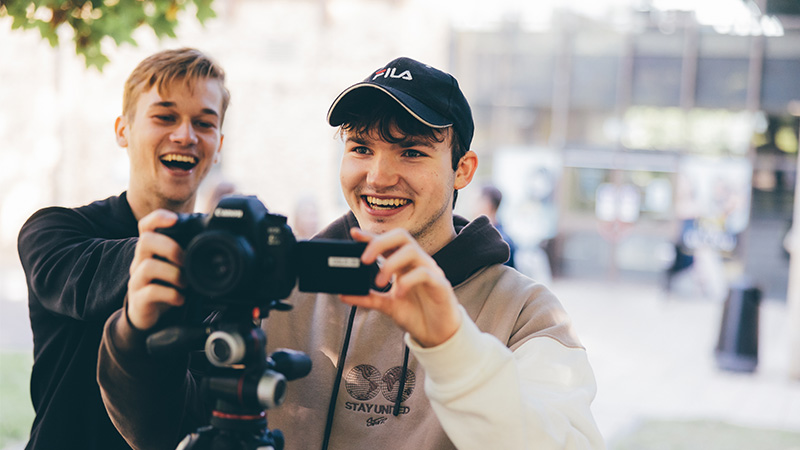Full time: 1 year September - September
Part time: 2 years September - September
Location: Headington
School(s): School of Arts
Overview
Considering a career in the creative industries? There’s never been a better time, with this sector contributing over £13 million to the UK’s economy every hour.
Whether you've interest is in film, music or digital media production, our MA Creative Industries course is designed to meet the high demand for those with specialist creative skills. We even have our very own student-led creative agency, Brookes Creative, where you can gain invaluable hands-on experience.
But applying your expertise to real challenges doesn’t end there. In the Optional Work Placement module, you could work on a real assignment for a local business or organisation. For example, creating public awareness videos for Thames Valley Police, or making publicity films and social media for our local independent cinema.
One in eight UK businesses are in the creative industries, which means there are endless career opportunities. Throughout the course you’ll be building on your interests and strengths, while discovering what it takes to stand out from the crowd and impress potential employers after you graduate.

Why Oxford Brookes University?
-
Geared towards industry needs
We’ve designed this practical course to meet the growing demands for specialist skills in the creative industries.
-
Leading academics
Our tutors and lecturers are experts in their specialist fields, researching and publishing in subjects such as film music, sound art, film audiences and immersive documentary.
-
Our own agency
Brookes Creative, our student-led agency, brings like-minded creatives together to bring their projects to life.
-
Creative partnerships
It’s a collaborative environment at Oxford Brookes. Film students get together with music students to complete their final project, forging partnerships that reflect the real world.
-
Links with local businesses
Thanks to our partnerships with local organisations like Oxford Contemporary Music and The Ultimate Picture Palace, you’ll have great opportunities to work on real-life projects.
Course details
Study modules
Film students will focus on the production and consumption of narrative feature films in both contemporary and historical periods. You will learn how to analyse recent and classic films in their industrial context, to engage with film curatorship and festival programming, and to as consider the rich microhistories of cinemagoing and spectatorship.
Music students will investigate how and where music is produced and the ways that it is consumed. You will analyse a range of venues.The ways that music is consumed have radically changed in recent decades, and you will therefore learn tools to research all the contemporary facets of music distribution, music gatekeepers and music audiences.
Digital Media Production students will examine a range of media including documentary feature films, shorts and television shows. You will have the opportunity to approach the documentary form both in terms of theory and practice, by researching and producing a short film taken from real life.
Please note: As our courses are reviewed regularly as part of our quality assurance framework, the modules you can choose from may vary from those shown here. The structure of the course may also mean some modules are not available to you.
Research
Academics in the School of Arts are part of The Creative Industries Research and Innovation Network which brings together researchers, professionals, and local communities to share expertise and build social change.
All School of Arts staff are active researchers publishing widely on subjects such as:
- Film music
- Opera
- Sound Art
- Film audiences
- Immersive Documentary
- Queer Theory.
Careers
After you’ve completed your MA in Creative industries, you’ll have the skills and knowledge to work and progress in one of the many creative and media industries.
You could pursue a career in cinema programming or marketing, for example, or film making or animation. Or if you want to gain your PhD, our research training means you’ll be ready for further study and an academic career.
Our creative agency has great links with local creative businesses, and the work you do in your final live project could help you make the decision on your future direction. It could be in:
- media production
- arts administration
- teaching and research
- digital marketing
- publishing and journalism.
Our Staff
Dr Alexandra Trott
Alexandra teaches topics on art theory and practice, covering Modern, Postmodern, and Contemporary art.
Read more about AlexandraDr James Cateridge
I teach undergraduate modules on the film industry, national cinemas and film festivals and exhibition. My postgraduate teaching is in industrial studies and film cultures.
Read more about JamesRelated courses
Entry requirements
Specific entry requirements
Applicants should hold an undergraduate degree at 2:1 or higher in any subject. All students will be required to attend an interview to discuss their application, this may be either in person or online. In addition, a portfolio of written or creative work may be requested from students without an academic background in the arts and/or humanities.
APEL applications will be encouraged for students with extensive professional experience. International applicants are required to achieve an IELTS score of 6.5 overall, with 6.0 in reading, writing, listening and speaking.
Please also see the University's general entry requirements.
Selection process
By interview
English language requirements
If English is not your first language you will need to satisfy the university's English language requirements for this course:
- minimum 6.5 (with a minimum of 6.0 in reading and writing and 5.5 in listening and speaking)
- if you have completed your undergraduate degree in the UK (at least one full year of study) you will automatically meet our English language requirements.
Please also see the University's standard English language requirements.
Pathways courses for international and EU students
We offer a range of courses to help you meet the entry requirements for your postgraduate course and also familiarise you with university life in the UK.
Take a Pre-Master's course to develop your subject knowledge, study skills and academic language level in preparation for your master's course.
If you need to improve your English language, we offer pre-sessional English language courses to help you meet the English language requirements of your chosen master’s course.
English requirements for visas
If you need a student visa to enter the UK you will need to meet the UK Visas and Immigration minimum language requirements as well as the University's requirements. Find out more about English language requirements.
Terms and conditions of enrolment
When you accept our offer, you agree to the Terms and Conditions of Enrolment. You should therefore read those conditions before accepting the offer.
International qualifications and equivalences
How to apply
Application process
Tuition fees
Questions about fees?
Contact Student Finance on:
Tuition fees
The following factors will be taken into account by the University when it is setting the annual fees: inflationary measures such as the retail price indices, projected increases in University costs, changes in the level of funding received from Government sources, admissions statistics and access considerations including the availability of student support.
How and when to pay
Tuition fee instalments for the semester are due by the Monday of week 1 of each semester. Students are not liable for full fees for that semester if they leave before week 4. If the leaving date is after week 4, full fees for the semester are payable.
- For information on payment methods please see our Make a Payment page.
- For information about refunds please visit our Refund policy page
Financial support and scholarships
Self-funded, postgraduate loans.
Additional costs
Please be aware that some courses will involve some additional costs that are not covered by your fees. Specific additional costs for this course are detailed below.
Programme changes:
On rare occasions we may need to make changes to our course programmes after they have been
published on the website. For more information, please visit our
changes to programmes page.

